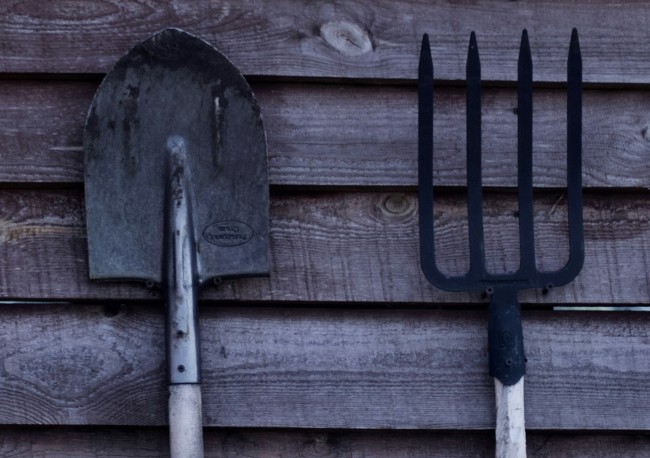
Image: Austin Neill
What happens when someone who spends her time supporting people through big life transitions makes a big transition herself? Natasha shares the key insights she’s gleaned from a turbulent year – and how you can apply them to your search for more fulfilling work.
This year, I turned my life upside-down.
I ended a long-term relationship, packed up my little house in the country I’ve lived in for the last 8 years, and took a 7-day road trip through Europe to set up home in a brand-new place.
The last 10 months have been hard. Beautiful and hard.
And after a decade of supporting people through big life transitions like career change, it’s been a poignant and humbling reminder of what these big transitions feel like on the inside.
I had worried, for a while, that it had been so long since I made my own shift that perhaps I was out of touch with the reality of the experience of our clients at Careershifters.
Not any more. I have been IN IT this year, and it has been A RIDE.
Somewhat embarrassingly, I’ve found myself reading my own articles for guidance on how to navigate the messy middle of a transition, and sending up little messages of gratitude to past-me for her perspective and advice.
So it feels appropriate, now, to do that again.
To record, for anyone who might find it useful (including future-me) what I’ve learned from these past hard, beautiful months, and what seems important to remember.
1. You can outgrow good things

I spent the last 8 years in a relationship with a good man; someone with a gentle, tender heart and a love of family and a goofy sense of humour. He was, and is, a good thing in my life and in the world at large. We respect one another deeply, and care for one another enormously.
And I left.
I spent the same amount of time living in a beautiful part of the world, filled with year-round sunshine and wild beaches and soaring mountain hikes. My sweet neighbours cared for me, pulled me into their community. It’s the first time in a long time – perhaps ever – that I’ve understood the sensation of ‘home’.
And I left.
I left because I needed to leave. I could give you a whole host of tangible reasons why things weren’t quite right, but all of them would have had good counter-arguments, and nothing’s perfect. But underneath all those reasons was a simple, uncomplicated truth: it was time to go.
Perhaps you feel the same way about your career. Maybe you were thrilled to get the job you currently have, when you got it. Maybe there’s still plenty to be grateful for about what you do. Perhaps you know that many people would look at your career on paper and think “How lucky you are”.
And when you compare that on-paper assessment of your career with the deep-down feeling of “not-this”, there’s a mismatch. In theory, you shouldn’t be feeling what you’re feeling.
But you are.
For a long time, on some level, I believed that things had to be bad in order to leave. I needed something to be angry about; something solid and painful, that everyone could see, to point a finger at and say: “This. This is my justification, my vindication.”
Surely things need to be unbearable in order to justify moving on? Shouldn’t you wait and see if how you feel passes, or improves? You need to ride this ride to the point of desperation, otherwise you’re throwing away something you should be grateful for. You mustn’t be hasty; change is too much of a wrench to be anything other than a last resort.
But a more humble and compassionate truth I’ve come to understand is this: there is a part of us that knows when we’ve simply outgrown something.
Whether we choose to think of it as a deep philosophical idea of Self, or an ancient primal instinct, or something else, there is often a little voice inside that nudges us when it’s time to grow, and time to go.
And even good things can be outgrown.
When a child outgrows their favourite pair of dinosaur shoes, we don’t rail against the shoes.
We expect children to grow, to change shape, to need new shoes. In fact, we sometimes even buy those new shoes a little bit too big, to make space for the inevitable growth that’s coming.
Is it time for you also to let a good thing go?
What might it take for you to give yourself permission to grow?
2. All change involves loss
![]()
There was a six-month gap between my decision to leave this place and the date of my move.
Six months to prepare myself, to clear out my belongings, to pack boxes and suitcases, to book a ferry, hike my favourite trails for the last time, hug my friends goodbye-for-now, and work out how to get an elderly dog from one of the southernmost points of Europe to one of the northernmost.
And, the part I hadn’t included in my ‘To-Do’ list: to sit on the edge of my bed and weep.
I knew in my bones that I was doing the right thing. I knew I was taking a step that I needed to take, and could be secure in that choice. I felt positive and hopeful about my future.
But oh, I still wept. This good, right, courageous choice came with a deep wrench in my solar plexus that I had not seen coming.
Many of the career changers I work with are certain they need to shift; full of frustration with the career they’re leaving and hungry for something different and new.
They talk about being underappreciated and bored; sick of office politics and busywork; furious that they’ve given so much of themselves to a career that no longer gives them anything back. The desire for something new is overwhelming, and the prospect of making it happen is thrilling.
They work hard to discover new ideas, build connections that can open doors, and build a bridge out of the part of the working world that they can’t wait to escape.
And then there comes a moment.
Subtle and startling, it appears from left-field, charged with a wave of unexpected sensation: grief. Grief for the ease of the familiar; the relationships forged; the identity built; the security of experience and expertise; the person they were who tried so hard for so long…
And in its unexpectedness, that grief gets confused with doubt.
“Surely,” they think, “if grief is present, that means loss is present – and if I’m losing something, doesn’t that mean I have something to stay for?”
I surfed that same wave this year.
And the conclusion I eventually arrived at was this: grief is the passage through which we get to leave things behind, unsullied by resentment.
It’s the soft reminder that nothing is just one thing: that whatever singular way we’re feeling, there’s still more there to feel.
All change involves loss.
We adopt and we shed; in order to pick up, we must put down. And by acknowledging what we’re losing, (whether consciously and rationally or through startling, out-of-the-blue floods of tears on the edge of the bed) we arrive at a place of balance.
We’re able to let in the fullness of an experience; all the different faces of the prism. The good and the less-good, the stagnation and the growth, the person we were and the person we’re becoming.
Grieving the career (or the relationship, or the place) we’re moving on from doesn’t mean we’re making the wrong move.
It’s inconvenient and it hurts, but, if we make space for it, it’s a revelatory part of the process.
What might you need to allow yourself to grieve about the career you’re leaving behind?
3. The here-and-now is louder than the future

A question I’ve been asked a lot this year is: “Are you excited about your move?”
It was hard, looking at people’s expectant faces, to reply honestly: “Not really – not yet.”
I was still waking up in the same little mountain home, still walking my regular dog walk routes, still chatting to the friendly cashier at the deli, still driving my battered little car to my friends’ homes for dinner.
I knew where I was moving to, but I didn’t yet know what life was going to look like when I got there.
The future was misty and abstract. I daydreamed and fabricated possibilities in my head, but they felt no more real than my other daydreams about one day being able to do a pull-up, or what I’ll say to Krista Tippett if she invites me to be a guest on her podcast (if you’re reading this, Krista, no pressure!).
My colleague Richard often talks about the gravitational pull of a career – how the career you’re in will keep you tied down until a new possibility, with a greater gravitational pull, appears.
The thing about gravity is that it relies on mass.
My current life had mass: it had physicality; things I could touch and smell and hear; tangible elements that made up my day to day reality. My future, on the other hand, was disembodied and amorphous – I had nothing that felt real to get excited about yet. Only hope, and my commitment, and the promise of the new.
I wonder if your future career feels that way, too?
Your daily routine is the same. The people you’re surrounded by are the same. You’re completing the same tasks, having the same conversations, going to the same places. Anything else feels fictional and dreamy.
You want to be excited about it, pulled towards it, energised by the simple possibility of it – and yet the emotion isn’t quite there. It’s not real yet. It has no mass.
And this gravitational imbalance can be unsettling.
When I realised this was what was going on, I decided to tackle it.
I found some people on social media who were based in my new part of the world and doing things that piqued my interest, and I dropped them a message.
“Hi – I’m moving to your part of the world soon and I’m trying to get a feel for what’s going on up there. I love what you’re up to – would you be up for saying hello at some point in the next few weeks? It would make such a difference to feel like I know some people in the area when I arrive…”
I booked a flight to go and visit for a few days – so my body could feel what it was like to be there, and when I returned home I could picture myself there with more concreteness.
I looked for volunteering opportunities in the area, found a project I was interested in, and sent them an email to start the ball rolling early.
I found the website for the local gym and picked out my classes ahead of time, putting them in my calendar even though it was months away.
I gave my new life some mass.
And as I did these things, the excitement began to grow. Tangible things, real people, dates and times. Still woolly, still distant, but it was something.
What might you do to give your future some mass?
4. Hard steps can be taken from soft places

My grandmother has a grab bar in her shower to keep her from falling.
Compassion has been my grab bar, this year.
I’ve navigated guilt, sadness, frustration, grief. I’ve had to do hard things; like telling my best friend that I was leaving; like handing in my notice on my beautiful little home and finding that it had a knock-on effect on my upstairs neighbours, who now had to move out too.
I’ve fallen into moments of beating myself up for feeling sad, for feeling like I’ve disappointed people, for having weeks where I couldn’t muster the energy to tackle the next thing on the Big Move To-Do List, even though the list was so long and it really needed tackling.
Maybe you’ve had weeks like that too? Times when the prospect of making a career change just felt too much, when you lost momentum or the emotion got too big?
My default M.O. in hard times is to put my head down and batter my way through – to chastise myself for being an emotional creature and try to buck myself into Productivity Mode. It works, in the short-term. But what I was doing this year wasn’t a short-term thing. What you’re doing isn’t, either.
Instead, I’ve learned that the softer I am with myself, the faster I bounce back.
When I give myself the compassion to feel what I’m feeling, and make room for the exhaustion, it passes through me quicker. It’s like liquid through a pipe: the more open the passage, the faster the flow.
And similarly, the softer I am with the situation I’m in, the more easily it moves.
I remember railing against my career change when I was in the thick of things: chastising myself for not making progress faster; feeling furious with my employer; pouring my energy into self-blame and trying to ‘be better’ at what I was doing. I got to my new career, in the end, but it was a tough old slog.
With this new change, I’ve been as gentle with myself as I could. Gentle, but firm. I’ve given myself time to breathe, and then brought myself back to the task, over and over again, with a soft hand.
I’ve taken advice from one of my favourite writers, Anne Lamott:
“Try looking at your mind as a wayward puppy that you are trying to paper train. You don't drop-kick a puppy into the neighbour's yard every time it piddles on the floor. You just keep bringing it back to the newspaper.”
Turns out, doing hard things doesn’t require a hard heart.
What would a more compassionate approach to your career change challenges look like?
5. People are priceless

I spend a remarkable amount of time talking about the importance of putting a support team around you when you’re making a career change.
This year, I learned: I have been a big old hypocrite for a long time.
I’ve waxed lyrical to career changers about authenticity; about being honest with people about what you’re going through; asking for support with things you’re finding challenging; trusting that people are almost always thrilled to be able to help. And yet I myself haven’t trusted people much.
Until now.
This year, people have stepped up to support me in ways I didn’t know I needed support with.
I have a friend who has sent me a daily text – on the surface telling me some nothing-y detail of her day, but actually just to let me know she’s there, and thinking of me, and available if I need to talk.
I spent an hour on a Zoom call with someone else, who built me a spreadsheet in real-time (with formulas!) to compare all the different shipping companies, their costs, and timelines.
I mentioned, in passing, to a neighbour that I needed to sell my car – and thanks to the neighbourhood grapevine, within 24 hours I had three people knock on my door to ask if it was still available. It was sold within 24 more.
People have given me air miles, Tarot readings, spare suitcases, furniture-lifting muscle-power, afternoons of dog-sitting.
They’ve come with me to bureaucratic-nightmare appointments to untangle tax paperwork, they’ve dropped tupperwares of ‘sopa de lentejas’ at my door, and handed me tissues as I bleated miserably at them about how I was ever going to carry a piano onto a ferry.
So here I find myself again, fingers poised to type the same thing I’ve typed so many times before – but this time with the truth of it in my bones, not just my brain: Let people in. Say what you need. Ask for what you want.
I know: the first few times feel like getting caught with your pants down.
The chorus of inner voices soar in protest: What will they think? Surely they’re too busy. They’re being nice about it to your face, but they must be rolling their eyes on the inside…
But the relief (and effectiveness) of letting people in is huge.
For me, at least, it felt like discovering a whole new layer of shortcuts in the video game: hidden staircases and little trampolines that bounced me up to the next level in record time. And the shrugs and smiles and hand waves – “Don’t be silly - it’s my pleasure!” were genuine.
No one thing that any individual person did was particularly demanding – a conversation; a tupperware of soup; a suggestion; an offer of a lift somewhere – but collectively, it all rocketed me forward.
What might happen in your career change if you allowed people to help you?
6. The date sets the pace

As I’ve compared the process I’ve been through this year with the process of career change, one thing has stuck out as a key difference: I knew when I was going.
And this is a painful point for most of the career changers I work with: you’re committed to making a shift, but you don’t know when it’s going to happen.
So much of the process of making a career change is about creating your future to step into, not just mapping the path to it. And as such, it can feel like a potentially Sisyphean slog, stretching far into the distance with no hint of an endpoint.
How do you pace yourself with no finish line to base it on?
How do you reassure yourself when success isn’t guaranteed?
How do you organise yourself when there’s no deadline to plan to?
Honestly, when that thought occurred to me, I almost gave up on writing this article. What was I thinking, comparing my experience this year to a career change? It wasn’t the same at all!
That is, until something else occurred to me: my move date was completely invented.
I chose it before I knew almost anything about what it would take to make it happen.
I didn’t know what my senior dog’s ailing health would be like by then, or if he’d even be able to travel. I didn’t know how long it would take to detangle myself from the tax system. I didn’t know if my landlord would allow me to end my contract early, or how I would sell my car, or how much notice a shipping company would need to move my stuff.
I certainly didn’t know about all the hiccups and obstacles and unexpected spanners that would fly into the works along the way.
I just picked a date that felt reasonably reasonable, and I told people about it.
And the act of picking a date made everything else move.
I got into action because I had to. I did my research because there was no time not to. I did the hard things because they needed to be done, and they needed to be done in the right order so that the next thing could happen.
Picking a date, in many ways, was the keystone of the entire process. It bound me to a course of action and gave me something to play for.
And look – if things hadn’t come off as they needed to, I could have moved it. At any point, I could have pushed it back or rearranged my plans.
This is a tool I use a lot with my coaching clients: inventing something to play towards.
Let’s say you’re going to be in your new career by 12 months from now.
How would you walk, how would you talk, where would you go, what would you spend your time doing, if that was the game you were playing?
Maybe it happens, maybe it doesn’t – but the act of setting the date sets the pace.
The terms of the game could be anything. You might decide:
- “I’ll be in my new career by this date”.
- “I’m going to hand in my notice on this date, no matter what (so I’d better do everything I can in the meantime to give myself something to do afterwards!)”
- “By this date, I’ll have three exciting potential careers in mind.”
- “By this date, I’ll have a phenomenal support team in place.”
Whatever the goal, give it somewhere to live in space and time.
What date could you choose to get your career change moving?
7. You need to choose your ‘hard’

I am not a logistics person.
Spreadsheets, numbers, timings and paperwork are not my natural forte. And a lot of what it takes to organise an international move, unfortunately for me, involves exactly this kind of stuff.
This year, I found myself avoiding things with every fibre of my being: putting off phone calls to the tax office; attempting to keep rental car pricing from different companies in my head instead of in a spreadsheet; dodging asking for help from people who find this stuff easy…
What’s your version of this? What hard things are you avoiding, in your career change?
Is it also asking for help? Is it pushing yourself to try something new? Going to that event where you won’t know anyone? Reaching out to someone you admire? Is it simply admitting that you need to make a change, and committing to the process?
And how hard is it to not do those things? Are you having an easy time as it is?
At some point along the way, I realised that avoiding these hard things was just as hard as doing them.
It left me lying in bed at night, head spinning with worries and what-abouteries and fears and confusion. It left me carrying the weight and the guilt of not-doing around with me for days and weeks at a time. It left me stuck, and pissed-off, and worn-out.
What I realised is this: it’s going to be hard either way.
So choose your ‘hard’.
Do you want the ‘hard’ of nothing changing, and these things you know you could be doing hanging over your head indefinitely, or do you want the ‘hard’ of doing something challenging – with the promise of something new on the other side?
What’s the first thing you might do, if you were to choose the other ‘hard’?
There’s no teacher quite like this

There are a lot of things I love about my work.
But at the core of it all, I think, is a fascination with how potent the process of change is.
It’s not always comfortable, or pleasant, but it’s real and it’s challenging and it’s wholehearted. Change brings us as close as anything I’ve encountered to the raw experience of being alive. I have felt alive this year.
When we step into a period of change, we are knocked off-centre, out of balance, away from autopilot mode. We are forced from the sidelines into the ring; to engage, to question, to notice and to create.
If we’re paying attention, it reveals so much – about ourselves, about what matters to us, about how we show up with others, where we hold ourselves back, what we can expect and achieve.
Do I want to spend all my time in this space? Absolutely not. I am tired, and I think I’ve got a cold on the way. There are plenty more lessons en route for me as I settle into my new life, and for now it’s time to rest.
But I’m grateful for it, and freshly present to what an honour it is to spend my time with courageous, bright people like you as you make your own way through.
And I’m curious: what would you add to this list from your own experience so far? What are you discovering about navigating the process of change that other people might benefit from reading? Add your lessons to the comments below.




